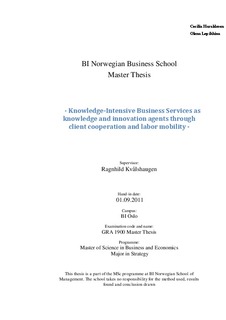| dc.description.abstract | Using unique databases from Norway, this thesis investigates the role of KIBS in innovation through two distinct mechanisms of knowledge transmission, namely client cooperation and mobility of KIBS employees, as well as importance of technological proximity and geography in these processes. The analysis reveals that 1) cooperation with KIBS seems to be of higher importance for innovation than acquisition of KIBS employees; 2) related knowledge appear to contribute more to innovation than similar knowledge; 3) labor mobility is strictly bounded in space, while cooperation relations are evenly distributed geographically; 4) location of KIBS as cooperation partners does not matter for innovation in client firms; however KIBS firms gain more from their local KIBS counterparts.
Our findings extend the existent literature on the mechanisms of tacit knowledge transmission in general, on specific roles of KIBS in innovation processes, as well as on conditions that impact the success of knowledge transfer. Our results suggest a number of managerial and policy implications. | no_NO |
